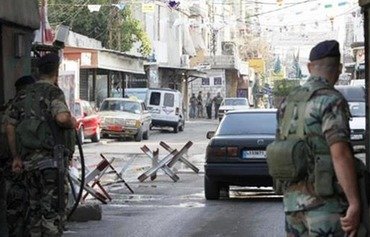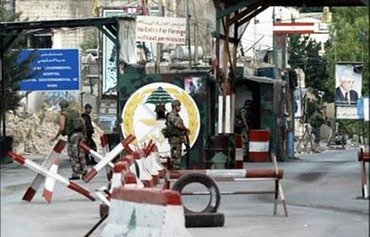Since the conclusion of operation Fajr al-Jurud (Al-Jurud Dawn), the Lebanese army and security forces have continued to launch pre-emptive operations inside the country that net extremist fighters on an almost daily basis.
Between September and mid-November, security agencies arrested dozens of fighters, arms dealers and smugglers working for groups such as the "Islamic State of Iraq and Syria" (ISIS) and the former al-Nusra Front (ANF).
Lebanese army intelligence officers on November 14th arrested fugitive cleric Mustafa al-Hujeiri, also known as "Abu Taqiyeh", in the border town of Arsal.
Known for his affiliation with ANF, al-Hujeiri had been indicted for his involvement in the kidnapping of Lebanese soldiers in Arsal in August 2014.
Other prominent arrests include that of Shadi Mahmoud Amoun, who is accused of being a member of ISIS and taking part in the Arsal clashes in 2014, and top ISIS leaders in Arsal Ibrahim Ahmed Zaarour and Syrian Udai Hassan al-Khatib.
In November, army intelligence arrested Kamal Darrar Badr, the brother of Bilal Badr, who is wanted on terrorism charges, and Yahya Yassin, the son of prominent Palestinian detainee Imad Yassin inside Ain al-Hilweh refugee camp.
The General Directorate of State Security (GDSS) arrested a cell of four Syrians in the Hasbayya area on October 19th, who they said had been scouting strategic locations in preparation to carry out bombings on behalf of ISIS.
The General Directorate of General Security on November 16th arrested two Syrian members of Aisha Umm al-Mouemeneen, a Syrian group led by Abu Jaafar al-Qastali that has conducted several terror attacks.
Dismantling sleeper cells
The recent arrests show that security in Lebanon "is under control, despite the concerns about security breaches", said strategy and security affairs expert Brig. Gen. Nizar Abdel Kader.
Security agencies, led by the army, have a database and search plans that enable them to take measures to respond to any terrorist threats, he said.
The dozens of arrests conducted over the past three months "confirm how highly effective the security agencies are, particularly the Lebanese army intelligence [directorate], in getting the job done", he told Al-Mashareq.
Most of the arrested individuals "can be classified as lone wolves, whose attempts to form new sleeper cells to replace the ones dismantled by security agencies were foiled", Abdel Kader said.
Security agencies have succeeded in infiltrating and dismantling most sleeper cells, he said, especially after the thorough infiltration of the Abdullah Azzam Brigades cell in Ain al-Hilweh camp.
Continued pre-emptive operations throughout Lebanon "are forcing the remaining members of the Azzam ring to look for any way out of Lebanon, as they feel they are being hunted down by the security agencies", he said.
This is a good indication of the success of these operations, he added.
The importance of these operations is that they are being carried out in all areas, even those to which the agencies were once forbidden entry, as they are now operating in remote areas and inside Palestinian camps, he said.
Close co-operation between agencies
The arrest of a large number of terrorists is reassuring, security strategy specialist and retired military officer Brig. Gen. Naji Malaeb said, and "underscores the close co-ordination between the various security agencies, which try to outperform each other".
"There is high co-ordination between them, for while the intelligence [directorate] operates throughout Lebanon, the GDSS conducts arrests in south Lebanon," he told Al-Mashareq.
This has netted arms traders and smugglers in Beit Jinn near Shabaa, adjacent to the border with Syria, and terrorists in Sidon's Ain al-Hilweh camp, he said, "while the GDGS plays its role in the south by arresting sleeper cells".
Following a meeting between director general of the Lebanese GDGS, Maj. Gen. Abbas Ibrahim and Palestinian President Mahmoud Abbas and other leaders, a databank was established inside the camp, he said.
This led to fugitive militant Shadi al-Mawlawi fleeing the camp to Syria in October.
"Some of the wanted terrorists in the Ain el-Hilweh camp turned themselves in to the Lebanese security authorities on November 13th," he added.
Pre-emptive operations
Operation Fajr al-Jurud "ended the presence of terrorist groups on Lebanese soil, but it did not end the preventive security war", said journalist Michel Nasr.
"The pursuit and arrest of terrorist elements falls in the context of pre-emptive security," he told Al-Mashareq, noting that raids targeting ISIS and ANF elements have been conducted inside Palestinian and Syrian refugee camps.
"Lebanon has reached a new level in the fight against terrorism," Nasr said, noting that "every one of the arrested individuals is important, in terms of the position he occupies in his group and the information he holds".
"The importance of Abu Taqiyeh's arrest lies in the fact that he played a prominent role in the Arsal events in August 2014 and the handover of the soldiers to the terrorists," he said.
He continued to cause trouble until his arrest on November 14th, when his house was stormed at dawn in a quick operation, after which he was taken to Beirut where he is being interrogated, Nasr said.
According to Nasr, Abu Taqiyeh's arrest "is the crowning achievement of the security agencies’ work, as he is one of the most prominent wanted [terrorists], being the second in command to ANF emir [in al-Qalamoun] Abu Malik al-Talli".

![Fugitive cleric Mustafa al-Hujeiri, also known as "Abu Taqiyeh", is seen in this file photo, taken prior to his November 14th arrest in the border town of Arsal. [Photo courtesy of Lebanon's National News Agency]](/cnmi_am/images/2017/11/30/10481-Mustafa-al-Hujeiri-600_384.jpg)





